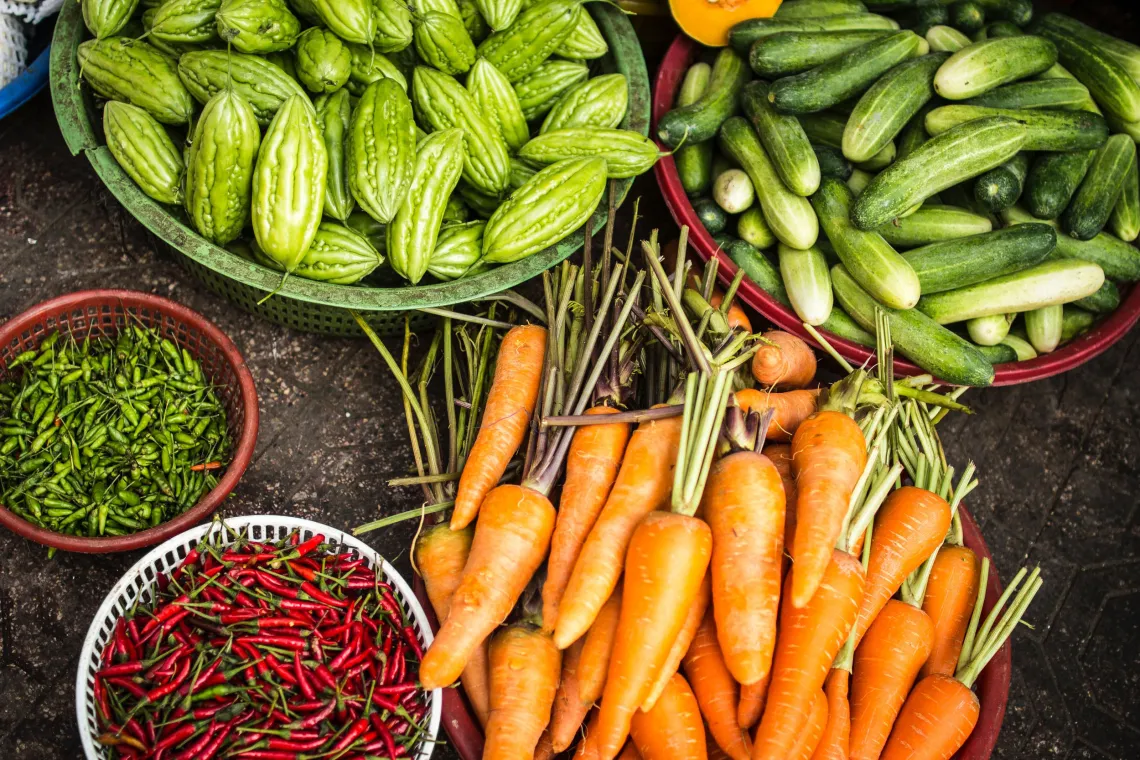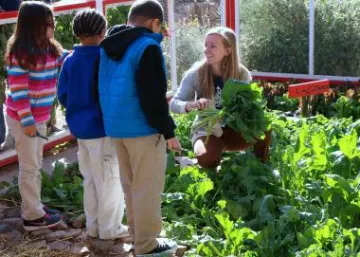The University of Arizona Offers Two New Food Programs

As new food-related majors are burgeoning across the country, the new B.A. in Food Studies and B.S. in Nutrition and Food Systems offer UA students exciting opportunities to explore the interdisciplinary nature of food.
The University of Arizona is offering two new undergraduate degrees related to food: a Bachelor of Arts in Food Studies and a Bachelor of Science in Nutrition and Food Systems.
Each degree will provide distinctive learning outcomes for students with different areas of interest in food. Food Studies focuses on the social, historical, and cultural dimensions of food; Nutrition and Food Systems focuses on the food system from production to consumption.

Both degrees will incorporate science and social science perspectives on food. The College of Social and Behavioral Sciences, or SBS, and the College of Agriculture and Life Sciences, or CALS, have created a collaborative curriculum with opportunities for students in the B.A. and B.S. degrees to engage in research, service learning, and other shared academic and extracurricular opportunities.
Tucson’s deep roots in food diversity and heritage, which resulted in its designation as a UNESCO City of Gastronomy in 2015, make the UA an ideal location for a rich range of scholarly study involving food. The coursework and internship opportunities of the new degrees are designed to ground student learning in this local context.
The University of Arizona is already home to a number of food-related degrees, such as CALS’ Nutritional Sciences and Food Safety degrees. The B.A. in Food Studies and B.S. in Nutrition and Food Systems will add to the menu of food options that, taken together, make the UA a top destination for students who are passionate about food and understanding the connection between food, nutrition, society, and health.
Creating Career-Ready Students
Food-related majors are burgeoning across the country, with growing demand in the workforce for leaders with expertise in food-related policy, food culture, and affordable food access.
“The new food degrees offer exciting opportunities for students to get involved in food systems both locally and abroad,” said Laurel Bellante, assistant director of the Food Studies degree program and assistant director of the Center for Regional Food Studies. “By structuring the degrees around a shared core curriculum, students will benefit from the wealth of faculty expertise across campus and will learn to work collaboratively across disciplines. This program is really about equipping students with the skills to become critical thinkers and change makers in our food systems.”
Both degrees will capitalize on university and community partnerships to create enriching experiential learning opportunities for students. CALS and SBS faculty collaborate with community organizations including the Community Food Bank of Southern Arizona; Yuma Regional Health Center; Native Seeds/SEARCH; the Mayor's Commission on Food Security, Heritage, and Economy; and the Pima County Food Alliance.
Michael McDonald, executive director of the Community Food Bank of Southern Arizona, said in his support letter for the Food Studies degree: “We believe there is a significant need for the proposed degree, one which will benefit the local food economy and local food system, improve the socioeconomic safety-net of southern Arizona, and provide a trained workforce for southern Arizona’s growing food movement.” He added that the Community Food Bank of Southern Arizona wants to work with the UA to place Capstone students throughout their organization and organizational partners.
In addition to learning about local food issues, students will be prepared to evaluate national and world-wide food production and to be marketable prospective employees to business and industry.
Michael Peel, Southern Arizona director of Local First Arizona, said that the knowledge students gain will “lead to jobs and career paths as leaders in the social, cultural, political, and economic dimensions of food. The major will significantly improve the Southern Arizona economy as we continue our growth as a UNESCO City of Gastronomy.”
Food Studies
Through the B.A. in Food Studies degree, which will reside in the College of SBS’s Transdisciplinary Programs, students will learn about the social, political, economic, and environmental dimensions of food and also understand the historical evolution and cultural significance of food within specific regional, national, and international contexts.
“Food is at the heart of the world’s most pressing social and environmental issues as well as some of the most promising innovations for change,” said Bellante.
Students will be prepared to help resolve complex food issues such as food insecurity, food deserts, food and environmental sustainability, food sovereignty, and cultural and entrepreneurial activity around food.
The degree integrates the College of SBS’s strengths in research and teaching about food. The majority of SBS units, including anthropology, history, and geography, already have food-related courses, most of which will be offered as options within the Food Studies B.A. SBS also houses the Center for Regional Food Studies, a hub for critical human-environment research related to food.
“We are excited that our collaboration with the College of Agriculture and Life Sciences has produced innovative new food majors for students,” said John Paul Jones III, dean of the College of Social and Behavioral Sciences. “Understanding the social and cultural dimensions of food, which is a focus of the new B.A. in Food Studies, is important for our times and our region, as we work with our community partners to address gaps in local food systems and increase food security.”
Amy Kimme Hea, associate dean of academic affairs and student success at the College of SBS, says the Food Studies B.A. is a great double major option for students, including transfer students. “The degree provides an entirely new approach at the undergraduate level to the study of food systems and justice. It will be grounded in the local food scene in Tucson, but it also will look at the Sonoran desert as a unique food system with a long historical tradition.”
Taylor Yamanaka, who is majoring in philosophy and minoring in economics and Mandarin, is excited to double major in food studies. Yamanaka, who is currently an intern with the Tucson City of Gastronomy, has wanted to be a chef since high school. “I want to understand food on a more macro, societal level, including the environmental aspects. l want to explore how food and culture and philosophy tie together.”
Nutrition and Food Systems
The B.S. in Nutrition and Food Systems degree, offered by the College of Agriculture and Life Science, is designed to teach students about the food system from field to fork, including the drivers of the food system and the environmental and human health outcomes.
“In CALS we’re developing new ways to put science to work to address many crucial food issues including supply, policies, economics, employment, natural resource use, human behavior, human wellness and retail—to name a few,” said Shane Burgess, Charles-Sander Dean of the College of Agriculture & Life Sciences. “This new program complements our existing degree offerings by bridging the production and consumption aspects of food with a focus on human health, but more importantly connects us to the College of Social and Behavioral Sciences to provide holistic education.”
Understanding the challenges of the food supply chain with respect to producing enough nutritious food that is safe to eat is embedded in the fabric of CALS, which provides a pivotal role to residents in every county of the state by increasing nutrition and health literacy, food access, and improvements to agriculture and the environment through Cooperative Extension programming such as the Tucson Village Farm, the Garden Kitchen, and other extension programs.
Students earning a B.S. in Nutrition and Food Systems will deal specifically with regional food issues such as food production challenges in an arid desert region, utilizing desert/local foods in product development and incorporating the cultural influences that shape the local cuisine. Students will also learn about the relationships between food security, nutrition, and overall health, preparing them with the knowledge and skills needed to manage and enhance the food supply chain to ensure sustainable production of nutritious, affordable food to feed a growing world population.
“Building on our department’s strength in research, this new program will connect our expertise in nutrition and exercise science to local community needs, giving students a deep understanding of the many facets of food and how it affects our health, environment, and communities,” said Scott Going, head of the Department of Nutritional Sciences. “We have a long history of partnering with Arizona communities to solve health problems, and this degree will enhance our students understanding of the cultural and community influences on an individual’s well-being.”
Both the Food Studies and Nutrition and Food Systems degree programs launch in the fall semester and are now open for enrollment.
Contacts:
- Alison Ewing-Cooper, assistant director of SBS Academic Advising, arewing@email.arizona.edu, for Food Studies
- Michelle Mendoza and Nita O’Cansey, Advisors, nscadvising@email.arizona.edu, for Nutrition and Food Systems

